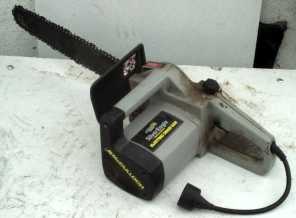Chainsaw
Chainsaw is a portable, mechanical saw powered by electricity, gasoline, or a battery. It is a versatile tool used in various activities such as tree felling, limbing, bucking, pruning, cutting firebreaks in wildland fire suppression, and harvesting of firewood. Chainsaws have also found their way into the sculpture and ice sculpture fields for artistic purposes.
History[edit | edit source]
The origins of the chainsaw are debated, but it is generally agreed that the first chainsaw-like tool was created in the 1830s by German orthopaedist Bernard Heine. This device, known as the osteotome, had links carrying small cutting teeth with the edges set at an angle; the chain was moved around a guiding blade by turning the handle of a sprocket wheel. As for the modern chainsaw, its development began in the late 19th century and was refined throughout the 20th century by various inventors and engineers around the world.
Design and Function[edit | edit source]
A chainsaw consists of several main parts: the engine, the drive mechanism (usually a clutch), a guide bar, and the cutting chain. The engine can be either a two-stroke gasoline engine or an electric motor. The guide bar is a long bar made of wear-resistant steel with a round end. The cutting chain, which circles around the guide bar, contains sharp cutting teeth. Modern chainsaws are equipped with safety features such as chain brakes, hand guards, and vibration reduction systems to protect the user from accidents.
Safety[edit | edit source]
The use of chainsaws requires protective clothing to reduce the risk of injury. This includes items such as safety helmets, eye protection, hearing protection, chainsaw chaps (to protect the legs), and anti-vibration gloves. Chainsaw operators must be trained in the proper operation and maintenance of the chainsaw to ensure safety and efficiency.
Environmental Impact[edit | edit source]
Chainsaws, especially those powered by gasoline, have an environmental impact due to their emissions. Electric chainsaws offer a cleaner alternative, but their use is limited by battery life or the need for an electrical connection. The noise pollution from chainsaws is also a concern, affecting both operators and wildlife.
Cultural Impact[edit | edit source]
The chainsaw has made significant contributions to various industries, particularly forestry and landscaping. However, it has also entered popular culture, often being associated with horror movies and the iconic image of the chainsaw-wielding villain. Despite this, the chainsaw remains an indispensable tool for many workers around the world.
See Also[edit | edit source]
Search WikiMD
Ad.Tired of being Overweight? Try W8MD's physician weight loss program.
Semaglutide (Ozempic / Wegovy and Tirzepatide (Mounjaro / Zepbound) available.
Advertise on WikiMD
|
WikiMD's Wellness Encyclopedia |
| Let Food Be Thy Medicine Medicine Thy Food - Hippocrates |
Translate this page: - East Asian
中文,
日本,
한국어,
South Asian
हिन्दी,
தமிழ்,
తెలుగు,
Urdu,
ಕನ್ನಡ,
Southeast Asian
Indonesian,
Vietnamese,
Thai,
မြန်မာဘာသာ,
বাংলা
European
español,
Deutsch,
français,
Greek,
português do Brasil,
polski,
română,
русский,
Nederlands,
norsk,
svenska,
suomi,
Italian
Middle Eastern & African
عربى,
Turkish,
Persian,
Hebrew,
Afrikaans,
isiZulu,
Kiswahili,
Other
Bulgarian,
Hungarian,
Czech,
Swedish,
മലയാളം,
मराठी,
ਪੰਜਾਬੀ,
ગુજરાતી,
Portuguese,
Ukrainian
Medical Disclaimer: WikiMD is not a substitute for professional medical advice. The information on WikiMD is provided as an information resource only, may be incorrect, outdated or misleading, and is not to be used or relied on for any diagnostic or treatment purposes. Please consult your health care provider before making any healthcare decisions or for guidance about a specific medical condition. WikiMD expressly disclaims responsibility, and shall have no liability, for any damages, loss, injury, or liability whatsoever suffered as a result of your reliance on the information contained in this site. By visiting this site you agree to the foregoing terms and conditions, which may from time to time be changed or supplemented by WikiMD. If you do not agree to the foregoing terms and conditions, you should not enter or use this site. See full disclaimer.
Credits:Most images are courtesy of Wikimedia commons, and templates, categories Wikipedia, licensed under CC BY SA or similar.
Contributors: Prab R. Tumpati, MD





